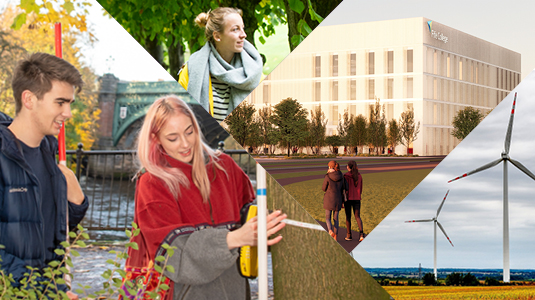SFC news published since 2018. See SFC archived content for earlier news articles.
This Climate Week Hazel Dalgard takes a look at how Scotland’s colleges and universities are responding to the climate crisis following a summer of increased heatwaves, floods and droughts.


The climate crisis is getting worse. In the past year we have seen floods and droughts undermining water and food security, destroying homes and infrastructure, affecting people and livestock, increasing poverty, and reinforcing inequality. The UN Secretary General has stated “the climate crisis is a human crisis” and recently described the devastating floods in Pakistan as “climate carnage”.
Closer to home the summer of 2022 brought droughts and heatwaves – Scotland smashed its all-time highest temperature at 34.8 degrees Celsius. 2022 is so far the driest UK year since 1976 but the temperatures were consistently higher. We have long been warned of the perils at home and abroad if we continue down this path. The only way out of climate catastrophe is to mitigate it by cutting emissions and adapt to it by preparing for future impacts and increasing long term resilience. We also need to apply courage, resilience, and determination.
Climate adaptation means deploying the resources, capacity, and know-how to prepare for and withstand the negative local and global impacts of climate change. Climate adaptation as a topic was popular at COP26 and seems set to be strengthened at COP27 later this year. It makes no sense in the times that we are living in to continue to burn fossil fuels and deforest when our future relies on precisely the opposite – cutting emissions, safeguarding nature, locking away carbon and protecting food and water.
Principles and outcomes supportive of both people and planet should be hard-wired into policy and investment frameworks and are reflected in what Scotland’s universities and colleges are doing right now. Scotland’s institutions are forging a strong pathway towards net zero here and globally. The national net zero target enshrined in legislation is 2045. Institutions’ activities and expertise weave an intricate supporting web as part of our climate response, spanning and reaching across a multitude of areas we will need to respond to effectively. The Scottish further and higher education sector is contributing expertise in national and local adaptation plans including in Glasgow, Edinburgh, and Aberdeen. A striking example is the GALLANT project in Glasgow where the University of Glasgow has won around £10 million from the UK’s Natural Environment Research Council to embed sustainable approaches in reaching Glasgow City Council’s 2030 net zero target, including restoring biodiversity and securing community benefit.
SFC is supporting new and changing net zero skills opportunities, research and innovation opportunities including in support of the Sustainable Development Goals. Our decade long funding for the Energy Skills Partnership enables several college training networks in support of ScotWind and other key skills needs for net zero transformation. Our recent Alliances for Research Challenges include food and energy projects. UK Global Challenges Research Fund projects Scottish institutions are participating in include SAVE a group of conservation organisations to protect vultures in Europe and Asia (University of the Highlands and Islands), and the University of Aberdeen expertise in delivering a project on Ethiopian soil loss and resilience.
We are supporting university and college estates’ net zero transformation, for example, EAUC Scotland receives core funding from SFC to support the sector in decarbonising by providing practical advice and guidance.
Our university financial transactions programme supports estates decarbonisation, adaptation and resilience as part of institutions acting as civic anchors, community enablers and demonstration hubs in cities’ and regions’ wider net zero plans, for example, funding for the University of Strathclyde is supporting its contribution in the Climate Neutral Innovation District in Glasgow, including renewable heat developments and greater resilience.
As these examples illustrate there are wider benefits in taking climate adaptation action, beyond safeguarding natural resources and adapting for just transition opportunities. For example, better health and wellbeing, increased local and sustainable food or energy production and biodiversity, better equalities outcomes, better housing, improved transport and community-led solutions.
The Scottish Government approach in creating just transition sectoral and regional plans from this autumn reflects the need to embed social benefit and greater resilience as part of our climate response and net zero transition. The adaptation agenda is reflected in Scottish Government progress on land reform, sustainable food, the circular economy, biodiversity, natural capital, and the blue economy.
SFC funding and the activities of institutions and colleges is crucial in supporting the delivery of the just transition and building greater climate resilience. We will continue to profile the work taking place in Scottish institutions that supports these outcomes and we will continue to reaffirm our commitment and challenge ourselves even further on supporting Scotland’s net zero journey.

